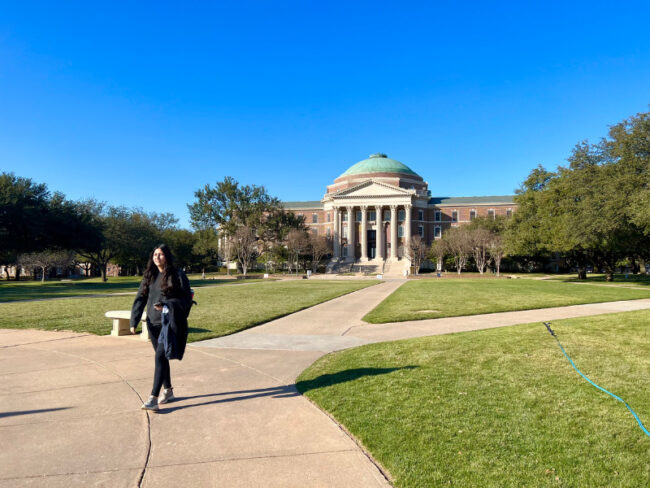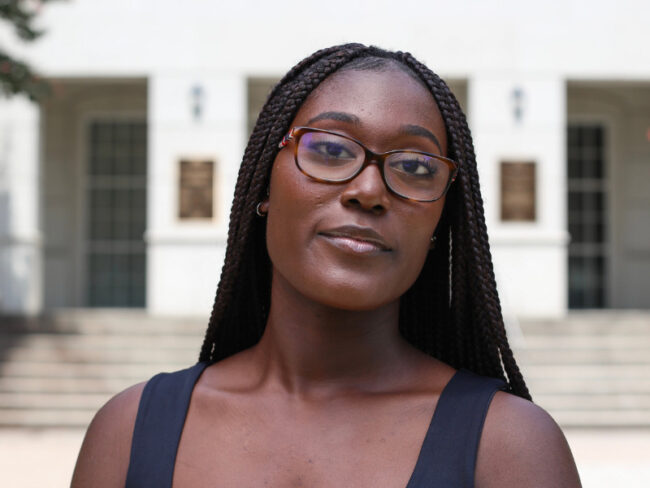By Dani Perales
When Abena Marfo didn’t make it into the final round of QuestBridge, a program that connects low-income first-generation students to universities, she lost hope of going to college.
“Ok, that’s the end of it. I’m not going to college,” she thought to herself. “Forget it.”
That was four years ago.
Now as Marfo prepares to graduate from Southern Methodist University in May, she leaves behind a legacy as one of the first students to wear a new honor cord that she helped implement for first-generation graduates for years to come.
Raised by a single mom who moved from Ghana to Dallas and never went to college, Marfo was determined to pave her own way.
“Going to college for me meant some type of access to a sturdier life, meaning both economically, mentally, and socially,” she said.
Marfo wanted to break the repeating cycle in her family and open doors her parents did not have, but Marfo did not know where to begin.
“It was a hard time, and we were really tight on time,” she said.
When she started at SMU in 2019, she was not sure if she would fit in. She began to fall behind in classes, not able to keep up as other students from elite private schools did. She juggled three jobs, including Resident Assistant (RA), Rotunda Fellow, and student ambassador in the undergrad admissions office.
Marfo’s obstacles as a first-generation student encouraged her to make a difference. She realized the university wanted her input on being a first-generation America (first-gen) and she knew there was no way to advance if change did not start. She co-founded SMU’s First-Generation Association to bring awareness about the struggles first-gens encounter in college, such as financial burdens, working multiple jobs, managing language barriers, and difficulties navigating the college system. She wanted to help first-gens succeed academically, socially, and economically.
“Transitioning to college is hard. Transitioning into a really white university as a first-gen is insane,” said Marfo, who is Black. “SMU was like no other place. It’s a cultural shock.”
Marfo’s dream started to take shape when she first got accepted into SMU. However, she knew she would not be able to afford the tuition without assistance.
“I was winging my whole college application process and shooting for the best,” Marfo said.
Then, SMU representatives went to her high school to announce she was one of up to 10 high school seniors to receive a four-year Mustang Scholarship.
“I was really at a loss of words. I was like, ‘oh my gosh, I can finally breathe again,’ ” Marfo said. “I have a set route to go through.”
Even then, Marfo said she was hesitant about sharing that she was a Dallas County Mustang scholarship recipient and a first-gen student because other students knew that meant she came from poverty. She quickly realized she wasn’t like a lot of other students.
“Let me put my head down and get out of here in four years,” she would think to herself.
Marfo gradually found out she was not alone. Hundreds of students had very similar experiences as her, like sophomore Ixchell Ibanez.

“As a first-gen student, I didn’t really have the knowledge of what to expect to go to college as someone who had both their parents go to college,” Ibanez said.
Ibanez felt overwhelmed transferring into SMU her spring semester after attending Collin College for a semester. She was not expecting the financial hardships, despite receiving financial government assistance for college students. Ibanez did not know how speaking Spanish as her first language would create yet another challenge.
“A lot of students at SMU come from very affluent families and don’t understand what it’s really like being first-gen,” Ibanez said.
Ibanez felt her classmates didn’t understand the struggles associated with being a First-Generation American. Hesitant with her identity as a first-gen, Ibanez met the current president of the First-Generation Association, Teresa Acosta, who welcomed her into the club.
“I got involved with first-gen and realized I wasn’t alone,” Ibanez said. “They too didn’t really know what they were getting into.”
Acosta realized the circumstances and hardships she and others experienced, which motivated her to run for president of the First-Gen Association.
“It’s time to make a change, whether it’s making more events supporting first-gens or making policies here at SMU like establishing a universal definition,” Acosta said.
Acosta said SMU’s First-Generation Association aims to foster an environment where students feel welcome while also providing resources that would benefit them.
Ibanez has attended many of the events this semester as well as utilized their resources, including free printing and the Career Closet, where first-gens can pick out a business outfit free of charge to help them when they interview for jobs.
As a member of the First-Generation Association’s executive council for four years, Marfo recognizes the ongoing challenges.
“First-gens have their own invisible obstacles,” Marfo said. “A lot of late nights, working multiple jobs, and being a student at SMU does not always reflect this.”
Cords will signify students who made it to graduation amid the obstacles and help gain recognition from their families, friends, and SMU faculty. With this cord, Marfo will have the opportunity to showcase her many achievements at graduation like other students. She will continue to grow her legacy at grad school for her master’s degree in public health at Emory or Columbia.
“It’s kind of signifying the curse you broke, meaning anybody else after you won’t be first-gen,” Marfo said.
SMU students across campus and in the Dallas area are engaging in new and unique ways to contribute to their communities. This is a story reported as part of a Trailblazer series by students in Annette Nevins’ Feature Writing course in spring 2022.





















